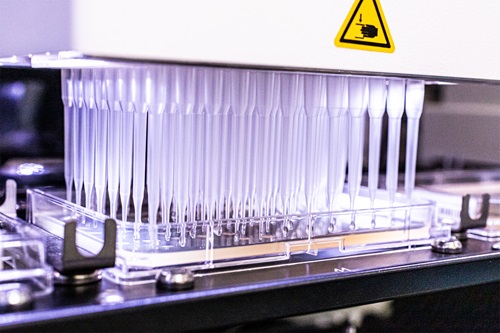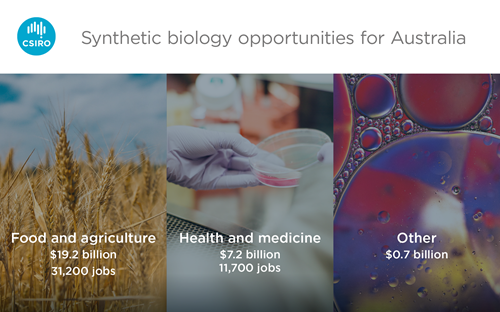Synthetic biology promises a $27B dividend for Australia
Australia could develop an industry worth up to $27 billion a year and create 44,000 jobs by 2040 by building its synthetic biology ecosystem, according to a new report released today by Australia’s national science agency, CSIRO.
 Image: CSIRO
Image: CSIRO
Australia could develop an industry worth up to $27 billion a year and create 44,000 jobs by 2040 by building its synthetic biology ecosystem, according to a new report released today by Australia’s national science agency, CSIRO.
Synthetic biology is a rapidly growing field that applies engineering principles and genetic technologies to biology, drawing on biology, engineering, and computer science, as well as many other fields.
According to the new report, A National Synthetic Biology Roadmap: Identifying commercial and economic opportunities for Australia, the two biggest areas to benefit from synthetic biology are the food and agriculture (up to $19 billion) and health and medicine sectors (up to $7 billion).
Australia has invested at least $80 million in developing synthetic biology research capabilities in recent years.
CSIRO is focussed on developing capacity in synthetic biology including through a new BioFoundry facility in Queensland which provides a bioengineering capability to the research and development community to rapidly design, build and test new biotechnologies.
Professor Claudia Vickers, Synthetic Biology Director at CSIRO said the scientific impact was encouraging, and with sustained investment can deliver increased impact and economic benefit.
“Synthetic biology can help overcome a range of global challenges, particularly in agriculture and health. It can also enable Australia to transform its economy by creating new, more sustainable industries and generating jobs,” Professor Vickers said.
“Bringing technology, the research community and other stakeholders together to enable start-ups, private investment and growth of market share will be essential to achieve the vision outlined in the Roadmap.”

Greg Williams, Associate Director CSIRO Futures and lead author of the report, said Australia needs to act quickly to secure a key role in this emerging global capability.
“Australia must act now if it is to capitalise on its early research investments and enable the long-term success of this emerging ecosystem,” Mr Williams said.
“To do that, Australia would need to place a greater focus on the translation and scale-up of synthetic biology into commercial opportunities for global markets.”
About the roadmap
The Roadmap was developed with input from 140 stakeholders from over 60 organisations to identify priority actions that can help set the foundations for a valuable and impactful synthetic biology ecosystem, including:
- Support research translation and seed new businesses through targeted investments and bioincubator programs
- Develop shared infrastructure to enable development and demonstration of synthetic biology applications
- Attract international businesses and talent to build critical mass and enhance international collaboration
- Strengthen foundational ecosystem enablers including leadership, governance, skills, and collaboration.
This report builds on previous efforts including the detailed horizon scanning report, Synthetic Biology in Australia, produced by the Australian Council of Learned Academies (ACOLA) in 2018.
